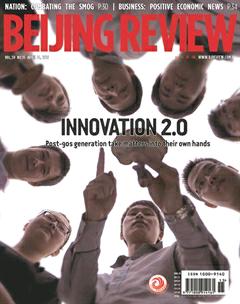Locking the Backdoor
2016-08-20ByCorrieDosh
By Corrie Dosh
Locking the Backdoor
By Corrie Dosh

As the global conversation develops over who owns what technology,and what rights consumers and companies have,new moral questions are raised
After an acrimonious battle over privacy,the U.S.Federal Bureau of Investigation (FBI) announced on March 28 that it managed to unlock an iPhone 5C belonging to one of the shooters of a December 2015 terrorist attack in San Bernardino,California,without the help of Apple Inc.
The tech giant staunchly refused to help the FBI in its request for software that would unlock the phone,saying that it put the privacy of all of its iPhone customers at risk.Now the tables have turned,as Apple's security faw isn't being revealed by the FBI.
While details are scarce,some news outlets citing anonymous sources have identifed Israeli police technology maker Cellebrite as the source behind the FBI's ability to access the phone in question.The program allegedly allowed the FBI to enter more than 10 passwords incorrectly without permanently rendering the phone's data inaccessible.
That hack allowed the FBI to use software to run potential pass codes until landing on the correct one.One anonymous law enforcement offcial said its applications were limited,and the FBI seems unlikely to release details on how exactly the hack was achieved.
The situation brings to light investigative techniques used by the government that are usually kept secret.Apple's concern is understandable.No company,especially one as large as Apple,wants a major security gap in its most popular product.Apple's reluctance to help the FBI in its efforts to unlock the phone,however,may now put it at a disadvantage in asking the government to disclose the security faw.
The situation has brought up new concerns,too.The U.S.Government may have used foreign hackers to crack the signature product of America's top technology company.Cases such as the San Bernadino debacle highlight that security concerns over mobile technology extend beyond the safety of users' data—national security has seemingly taken precedence over that of the individual in the United States.
Last month,for example,the U.S.Government placed major trade restrictions on China's ZTE tech company based on a case that dates back to 2012,when ZTE was accused of selling U.S.-made technology to Iran through a series of subsidiaries in violation of U.S.laws.While the U.S.Government has since announced that it will give ZTE “temporary relief,” further details have not yet been released.
Technological progress has made it difficult for any technology or business to belong to just one country.This is especially poignant given the changing world of international politics and the rapid growth of innovation that has broken through international borders and connected economies throughout the world to each other.
The Chinese Government has expressed opposition to the restrictions placed on ZTE.Some U.S.-based trade groups have also questioned whether blocking technological products is counterproductive to international relations,and have suggested that these actions could push other countries to develop their own technologies rather than buy U.S.-made goods.
The San Bernadino case demonstrates that American government investigators have no clear advantages over ordinary hackers when attempting to unlock a secure mobile phone.Also,exports to sanctioned countries become complex when a phone contains parts made in multiple countries.The world of technology has outpaced that of politics and national security.
In this new age,is it possible for any technological device to be completely secure? As the global conversation develops over who owns what technology,and what rights consumers and companies have,new moral questions are raised.
For many observers,the Apple vs.FBI dilemma harks back to another noteworthy case about the government's right to violate the privacy of citizens in the name of public safety.Former National Security Agency (NSA)contractor Edward Snowden revealed the scope of U.S.surveillance on its own citizens by leaking classified documents online in 2013,an act that forced him into self-imposed exile in Russia while being sought by U.S.authorities.
“Given the context here post-Snowden,I think Apple feels like this is a chance for them to publicly push back when there are lots of cases where they aren't allowed to publicly push back,” Andrew K.Woods,an assistant professor of law at the University of Kentucky,told Bloomberg News.“Before this revelation,people were starting to get concerned about Internet companies collecting information about them.Then Snowden happened and NSA was the big bad guy.”
Snowden himself has commented on the battle between the FBI and Apple,tweeting,“The FBI is creating a world where citizens rely on Apple to defend their rights,rather than the other way around.”
The author is a contributing writer to Beijing Review,living in New York City
Copyedited by Bryan Michael Galvan
Comments to yanwei@bjreview.com
